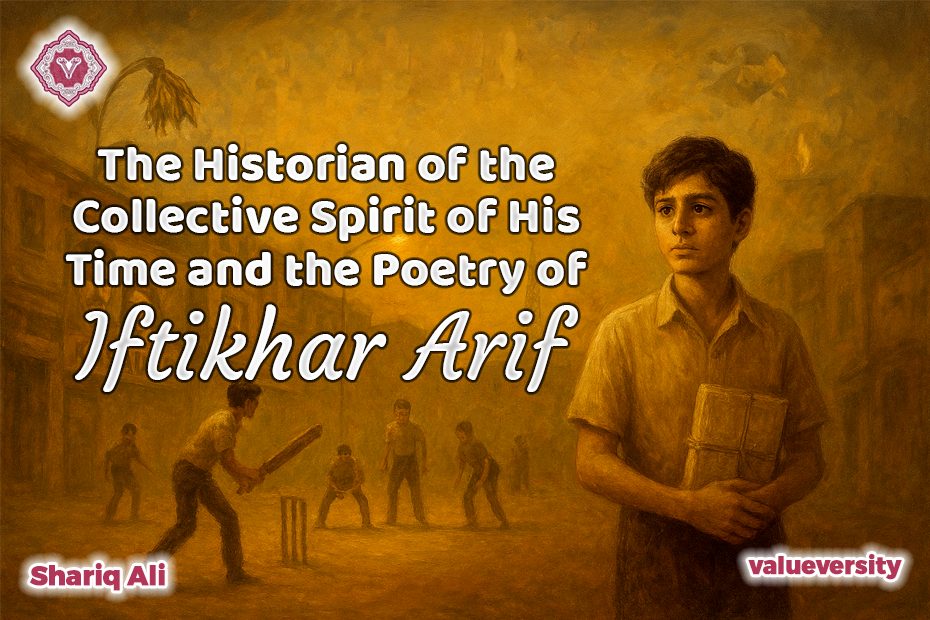The Historian of the Collective Spirit of His Time and the Poetry of Iftikhar Arif
Shariq Ali
Valueversity
This was in the 1970s, when I was about fourteen or fifteen years old. Like most evenings, I would play cricket in the street with a few friends from the neighborhood. Among these companions was Jameel, whose father held a senior post at Radio Pakistan. Jameel knew of my interest in poetry and that I had memorized some verses of Nasir Kazmi and Faiz. One day, after our game, Jameel unusually invited me to his house. Stepping outside the gate, he handed me—very secretly—a photocopied manuscript. Its pages were bound with a thin cord, known in Karachi slang as sutli. This was the unpublished poetry of Iftikhar Arif, shared among a few close friends for review before publication. After some insistence, I persuaded Jameel to let me take the manuscript home for reading.
I was allowed only two days to return this priceless treasure. Like most children of that era, I knew Iftikhar Arif from his television quiz program Kasauti, but this manuscript was my very first introduction to his poetry. Those two days of cursory reading left a deep impression on my adolescent heart. The poems and ghazals in the manuscript enthralled me. One of his poems, Barhwan Khilari (The Twelfth Player), I memorized entirely.
Looking back now, I see that this small incident became the doorway to my acquaintance with a major, serious poet.
Iftikhar Arif’s poetry forms a bridge between tradition and modernity. While firmly rooted in the cultural foundations of classical Urdu, he simultaneously addresses contemporary human struggles and collective tragedies in his poems and ghazals. His work is not merely an expression of romantic sentiment—it is also a cultural dialogue. In this dialogue, one finds the pangs of inner loneliness, the grief of social injustice, and the torment of existential anxiety.
At times, his verses take the form of a deeply personal prayer or lament; at others, they become a vivid symbol of social reality, leaving a profound mark on the reader. His heart has always carried the yearning to transform a material dwelling into a home in both spiritual and cultural terms.
His poems possess a unique tone and rhythm of their own. They capture, with intensity, the anguish of the common man and the dilemmas of the present age.
*ابھی کچھ دن لگیں گے
دل ایسے شہر کے پامال ہو جانے کا منظر بھولنے میں
ابھی کچھ دن لگیں گے
جہانِ رنگ کے سارے خس و خاشاک
سب سرو و صنوبر پھولنے میں
ابھی کچھ دن لگیں گے
تھکے ہارے ہوئے خوابوں کے ساحل پر
کہیں امید کا چھوٹا سا اک گھر
بنتے بنتے رہ گیا ہے
وہ اک گھر بھولنے میں۔۔۔۔۔۔*
What else can a writer do except raise his voice against injustice and oppression with the intensity of his passion and art? Iftikhar Arif’s poetry has fulfilled this duty with distinction.
His verses have sought to awaken the collective conscience of the present era and compelled readers to reflect on society’s moral directions. At the same time, they clarify that liberation from social decay requires patience, sacrifice, and the passage of time.
In his poetry, we encounter both the bitterness of collective life and the glimmer of hope.
His contemporaries have acknowledged his stature. Ahmad Faraz called him “a milestone in modern Urdu poetry.” Wazir Agha praised his fusion of existentialism and realism. Munir Niazi described him as “a shining star of Urdu poetry.”
In his work, the pain of exile, the loneliness of the self, and cultural references are so strongly present that the reader sees reflected both the anguish of his time and the mirror of his own soul.
Iftikhar Arif is a poet, yet it feels as though his deepest aspiration is to become the historian of the collective spirit of his age.
